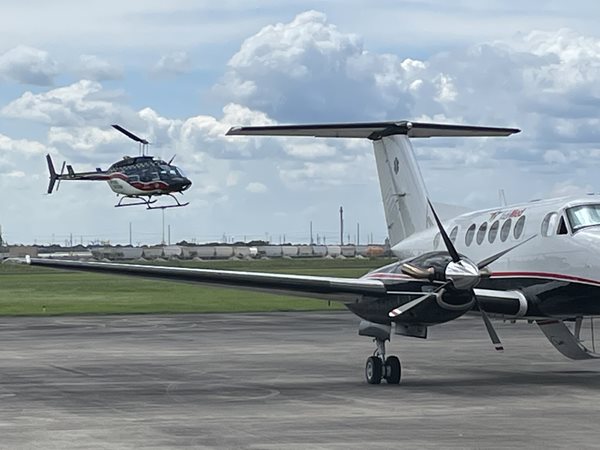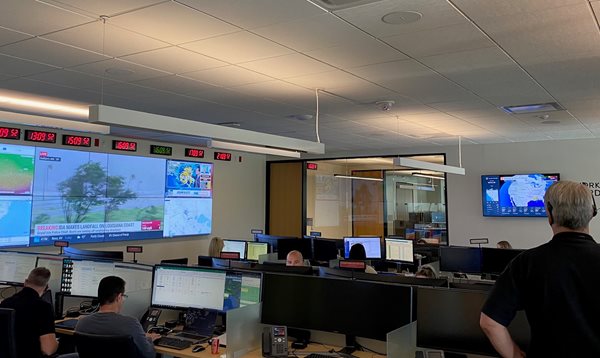GMR Deploys First Responders, Ambulances, Helicopters and Airplanes in Response to Hurricane Ida
8.29.2021
As part of American Medical Response's (AMR) FEMA contract, GMR deploys air and ground crews and medical transportation assets including first responders, ambulances, helicopters, airplanes and paratransit units to prepare to help Gulf Coast communities in the path of Hurricane Ida.
Latest activation is in addition to AMR’s FEMA COVID-19 deployments in Mississippi, Oregon, Kentucky, Louisiana and Missouri.
Responding to a FEMA request to help communities in the path of Hurricane Ida, Global Medical Response’s (GMR) activated dozens of first responders, ambulances, helicopters, airplanes and paratransit units to the Gulf Coast region. Saturday morning, FEMA asked the company to deploy ground crews and medical transportation assets to the area in advance of the powerful hurricane hitting landfall. On Sunday, FEMA asked the company to deploy more ground teams and ambulances in addition to air crews and assets as the hurricane gained strength. While in the region, these teams will provide hurricane-related emergency medical services under the auspices of FEMA. During the deployments, GMR will dispatch first responders (paramedics, EMTs, nurses) to evacuate patients and run EMS calls.
"Hurricane Ida’s strength, path and storm surge are very concerning because they could cut off communities from emergency medical care,” said Randy Owen, Chief Executive Officer of Global Medical Response. “GMR teams and partnering EMS agencies from around the country started arriving in the Gulf Coast region in response to this call for aid within hours of receiving the request.”
During the unprecedented events in 2020-2021, Owen said GMR teams have been on numerous COVID-related deployments, which includes helping communities deal with over-burdened EMS conditions due to COVID. The company also deployed to numerous natural disasters such as hurricanes and wildfires.
“For the past 20 months, GMR teams have remained steadfast in our mission of providing care at a moment’s notice,” he said. “We are extremely proud of all the dedicated first responders who answer the call during these crises. Our teams have the expertise and ability to care for those suffering during a crisis and a pandemic, and we continue to provide compassionate care to those we serve in communities throughout the country.”
As the nation's largest provider of ground medical transportation and FEMA's prime emergency medical service response provider, GMR’s ground operations, American Medical Response (AMR), has a national agreement with FEMA to provide ground ambulance, air ambulance, paratransit services and non-ambulance EMS personnel to supplement the Federal and military response to a disaster, an act of terrorism or any other public health emergency.
GMR Chief Operating Officer Ted Van Horne explained the company’s Office of Emergency Management prepares and trains throughout the year to plan for events such as major hurricanes. He said that COVID-19 safety precautions have added to the complexity of disaster responses. “GMR’s focus is ensuring the safety of patients and ground and air crews, making sure they have the equipment, support and resources they need to help our communities,” Van Horne said.
GMR’s National Command Center (NATCOM) in Lewisville, Texas, was activated on January 28, 2020 when the pandemic started hitting the United States. With the exception of a couple weeks in June 2021, NATCOM has been fully activated since that time to support the multiple deployments. When on active deployments, first responder crews and medical transportation assets are supported by GMR’s Office of Emergency Management at NATCOM, as well as onsite incident management teams in forward operating branches for the deployment.
Deployed crews are on various activations, which can change as the situation evolves. The crews will stay in the areas where they are deployed as long as needed. When the teams arrive at their assigned area, they will work under the guidance of FEMA, state and local EMS agencies.
Responding to a FEMA request to help communities in the path of Hurricane Ida, Global Medical Response’s (GMR) activated dozens of first responders, ambulances, helicopters, airplanes and paratransit units to the Gulf Coast region. Saturday morning, FEMA asked the company to deploy ground crews and medical transportation assets to the area in advance of the powerful hurricane hitting landfall. On Sunday, FEMA asked the company to deploy more ground teams and ambulances in addition to air crews and assets as the hurricane gained strength. While in the region, these teams will provide hurricane-related emergency medical services under the auspices of FEMA. During the deployments, GMR will dispatch first responders (paramedics, EMTs, nurses) to evacuate patients and run EMS calls.
"Hurricane Ida’s strength, path and storm surge are very concerning because they could cut off communities from emergency medical care,” said Randy Owen, Chief Executive Officer of Global Medical Response. “GMR teams and partnering EMS agencies from around the country started arriving in the Gulf Coast region in response to this call for aid within hours of receiving the request.”
During the unprecedented events in 2020-2021, Owen said GMR teams have been on numerous COVID-related deployments, which includes helping communities deal with over-burdened EMS conditions due to COVID. The company also deployed to numerous natural disasters such as hurricanes and wildfires.
“For the past 20 months, GMR teams have remained steadfast in our mission of providing care at a moment’s notice,” he said. “We are extremely proud of all the dedicated first responders who answer the call during these crises. Our teams have the expertise and ability to care for those suffering during a crisis and a pandemic, and we continue to provide compassionate care to those we serve in communities throughout the country.”
As the nation's largest provider of ground medical transportation and FEMA's prime emergency medical service response provider, GMR’s ground operations, American Medical Response (AMR), has a national agreement with FEMA to provide ground ambulance, air ambulance, paratransit services and non-ambulance EMS personnel to supplement the Federal and military response to a disaster, an act of terrorism or any other public health emergency.
GMR Chief Operating Officer Ted Van Horne explained the company’s Office of Emergency Management prepares and trains throughout the year to plan for events such as major hurricanes. He said that COVID-19 safety precautions have added to the complexity of disaster responses. “GMR’s focus is ensuring the safety of patients and ground and air crews, making sure they have the equipment, support and resources they need to help our communities,” Van Horne said.
GMR’s National Command Center (NATCOM) in Lewisville, Texas, was activated on January 28, 2020 when the pandemic started hitting the United States. With the exception of a couple weeks in June 2021, NATCOM has been fully activated since that time to support the multiple deployments. When on active deployments, first responder crews and medical transportation assets are supported by GMR’s Office of Emergency Management at NATCOM, as well as onsite incident management teams in forward operating branches for the deployment.
Deployed crews are on various activations, which can change as the situation evolves. The crews will stay in the areas where they are deployed as long as needed. When the teams arrive at their assigned area, they will work under the guidance of FEMA, state and local EMS agencies.

